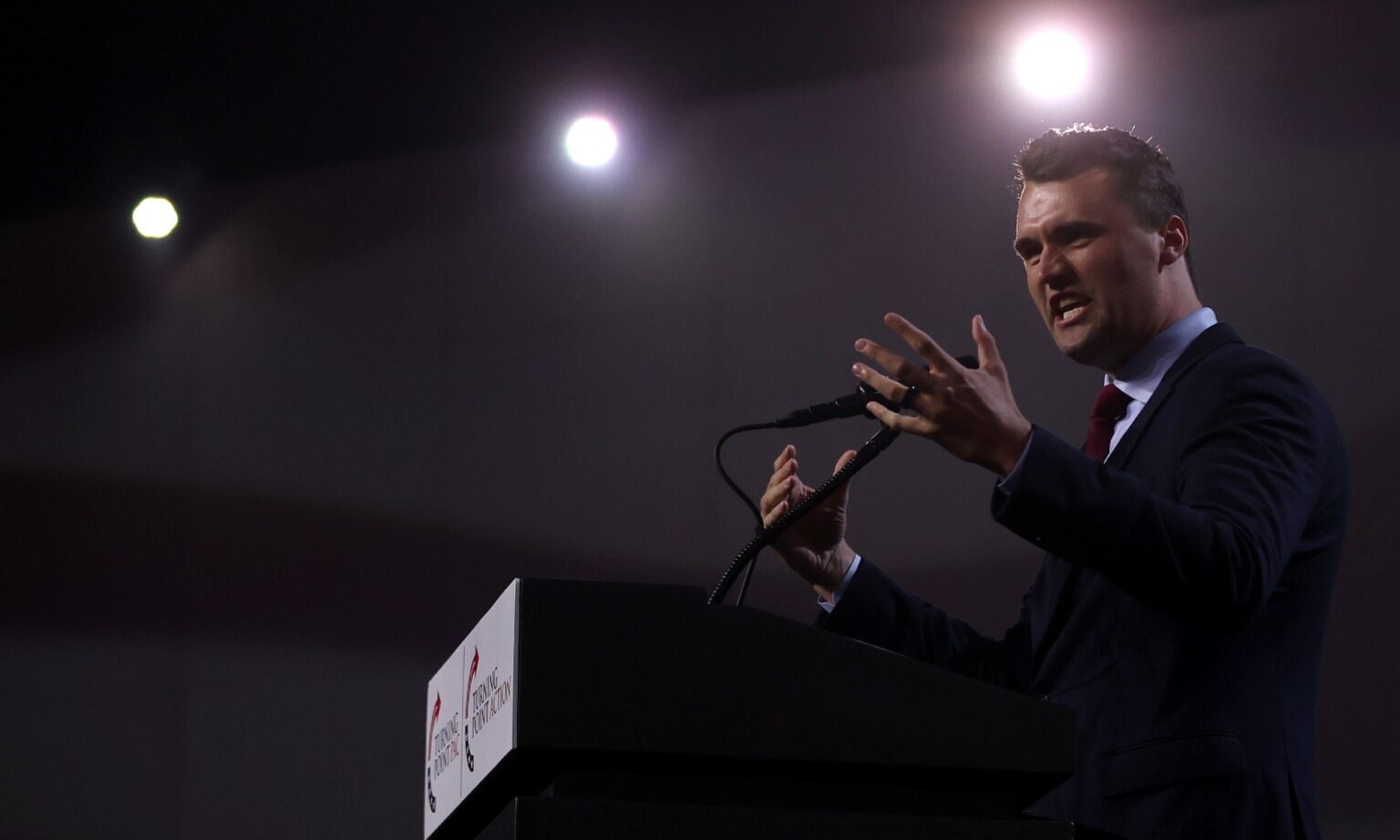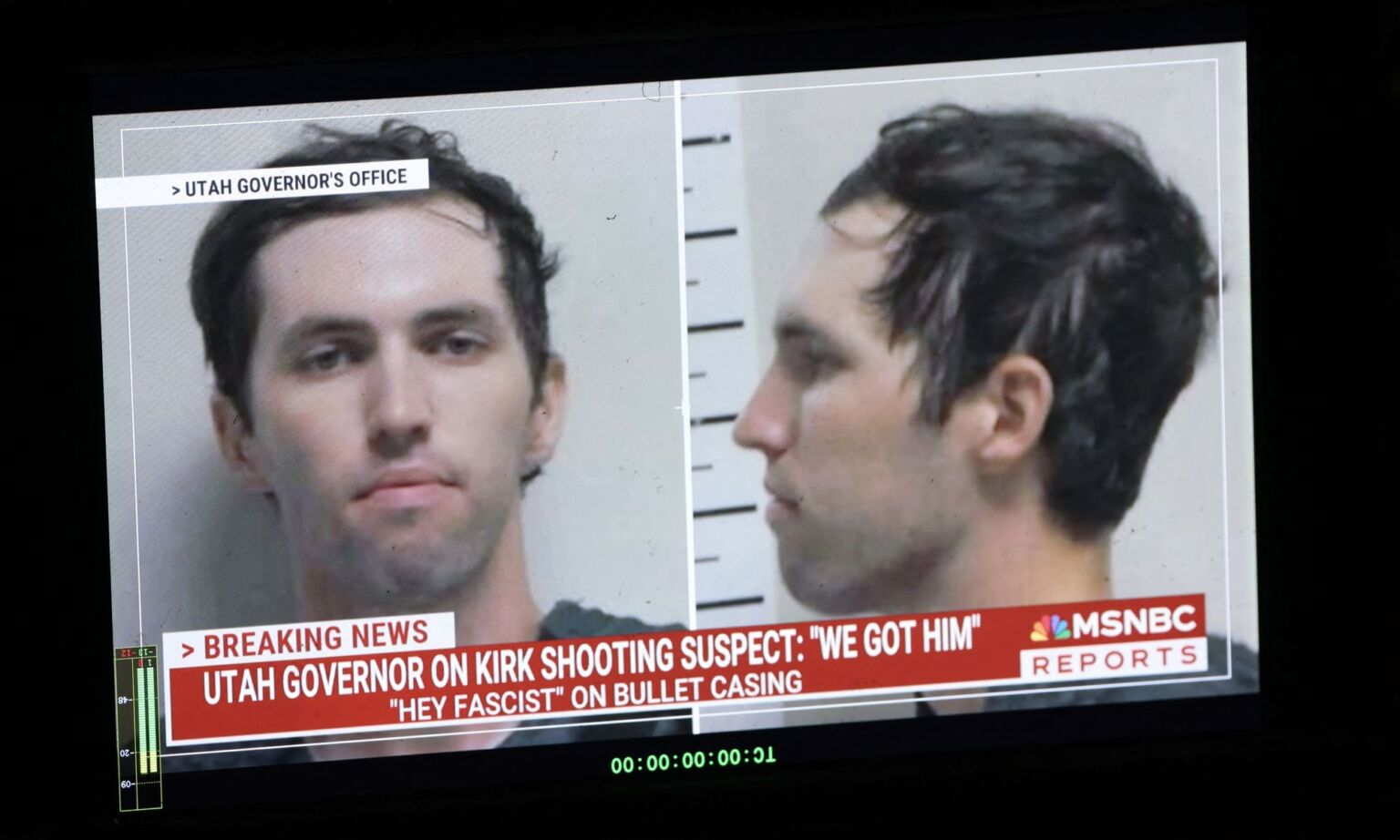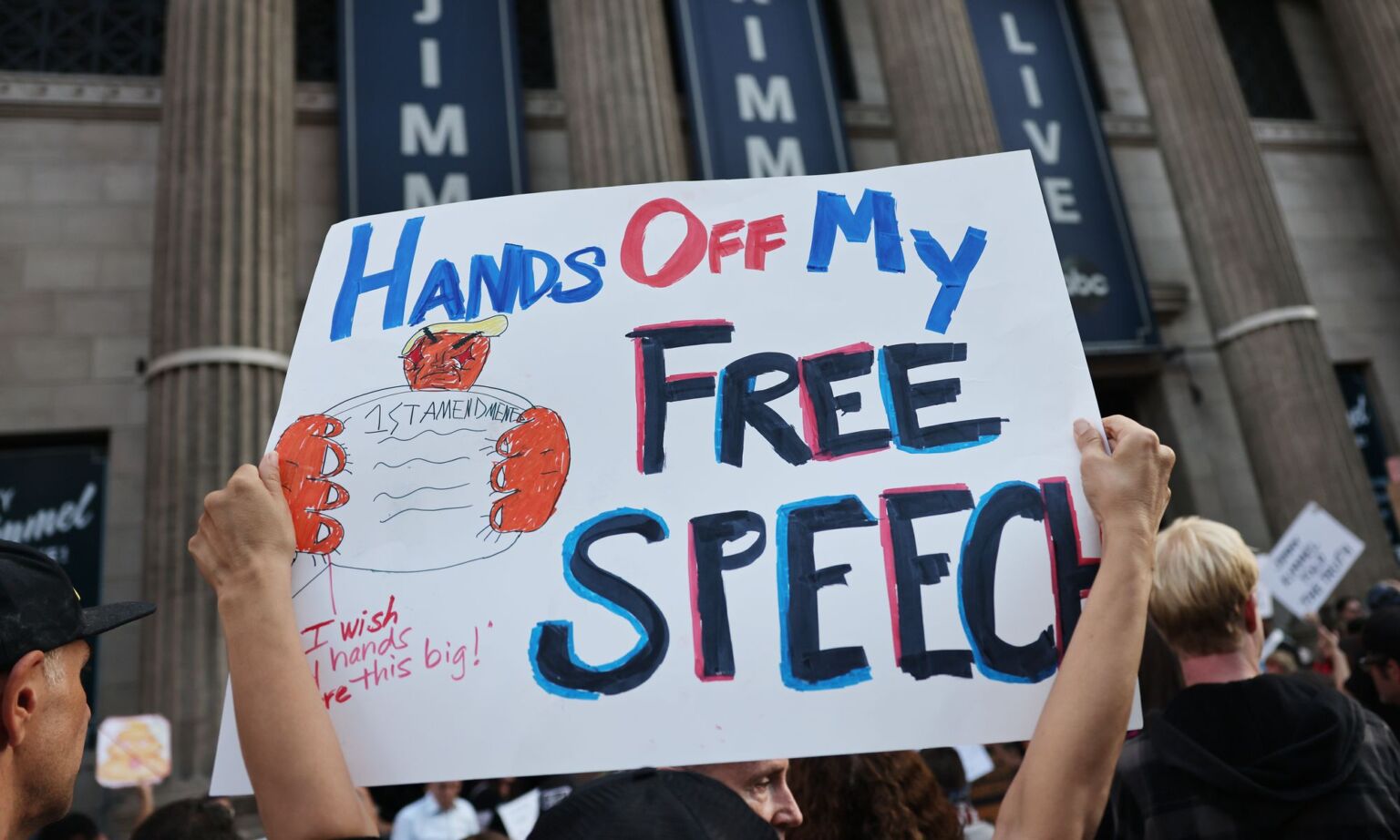
Long-read
How the ‘hate speech’ conceit fuels political violence
Charlie Kirk was killed by a left that feels entitled to silence its enemies, by any means necessary.
Want unlimited, ad-free access? Become a spiked supporter.
American conservatives have experienced a range of emotions in recent years, starting with amazement – amazement at the hypocrisy of the left. How many times have we heard that US president Donald Trump’s attempts to reform universities threaten academic freedom? Many of the people making this accusation have run professors out of town for dissenting from campus orthodoxies, whether regarding ‘systemic racism’ or climate change. These new-found free-speech crusaders have required faculty to sign loyalty oaths to the cult of diversity. At best, Trump’s accusers stood by silently while such shunning and conformity enforcement occurred.
When we hear complaints about Trump’s assaults on the press and on the entertainment complex, we recall that the Biden White House pressured social-media companies to censor dissenting views on Covid lockdowns and election integrity. We recall that Disney and NBC fired Gina Carano and Megyn Kelly for their politically incorrect views.
How many times has it been said that President Trump is waging a culture war? Often Trump is only belatedly playing defence in the left’s assault on the norms that humanity has embraced from time immemorial. Someone who seeks to restore the understanding, say, that girl’s bathrooms are for members of the female sex only is not waging a culture war. The cultural warriors are the ones who demanded male access to female bathrooms in the first place.
Someone who seeks to prevent teachers from reading books about queer identity to third graders is not waging a culture war. The cultural warriors are the ones who want to destroy childhood innocence by rubbing children’s noses in the sexual obsessions of adults.
The second emotion of conservatives in recent years has been shock at the depth of the cultural divide and despair at the possibility of bridging it. If liberals and conservatives can’t even agree on one of the great discoveries of Western science: that the genetic code is contained in every cell of the body and that it, not mere opinion, determines biological sex, then what can we agree on? If we disagree on whether men can have babies, what can we agree on?
When we saw college professors, academic bureaucrats, students and school teachers celebrating the massacre of Israeli civilians on 7 October, where do we find common ground? When we saw posters commemorating the Hamas hostages defaced and torn down, when we saw self-described ‘Fags for Falestine’ marching in support of a culture that prefers stoning gays to lionising them, we were puzzled. And when we saw the assassin of healthcare executive Brian Thompson become a progressive pin-up, we were dismayed.
But nothing prepared us for the reaction of the left to the assassination of Charlie Kirk. We face with blank incomprehension the question of how we move forward after what we have learned about our fellow citizens.
We were told after the beatification of Luigi Mangione, Thompson’s assassin, that his groupies constituted just a fringe of American society. We were told after the Hamas hagiography that these were complex geopolitical matters with arguments on either side.
But the celebrants of Kirk’s assassination do not come from the fringes, they come from the mainstream. And whether it is acceptable to shoot someone in the neck because you disagree with him about politics should not be a complex matter.
Here is a sampling of those laudatory reactions. The director of the office of equity, diversity and inclusion at the University of California, Los Angeles (UCLA) wrote: ‘It is OKAY to be happy when someone who hated you and called for your people’s death dies – even if they are murdered.’ In response to the statement that Kirk ‘shouldn’t be dead’, that same UCLA DEI director asked: ‘Why shouldn’t he be dead?… I’m always glad when bigots die.’
A middle-school teacher in Alabama – Alabama! – was so proud of how she had responded when her daughter informed her of Kirk’s assassination that she recreated her reaction for a TikTok video. ‘We need this right now’, she says in the video. ‘As a community, we need… this win… When [my daughter] does in fact confirm that he died, I said, “I hope it was traumatic and I hope he suffered, the way that we’re suffering because of the bigoted bullshit he spoke”.’
An associate dean for development at Middle Tennessee State University wrote: ‘Hate begets hate. ZERO sympathy.’
An assistant campus director at George Washington University wrote that it was fair to assassinate Kirk. ‘No thoughts, no prayers.’ A University of Michigan professor opined that ‘violence isn’t the answer; it is a solution’. A music professor at Clemson University called the 10 September, the date of Kirk’s assassination, a ‘beautiful day’.
There were threats to vigils for Kirk. Posters and memorials to him were vandalised, recalling the defilement of the Hamas hostage posters. Elementary school teachers who expressed sorrow for Kirk’s assassination reportedly faced a backlash from their peers. The mayor of Pinebluff, North Carolina, rebuked his constituents: ‘You should be ashamed of holding a rally for a racist like him.’
An opinion columnist for the Washington Post sneered at ‘absolution for white men who espouse hatred and violence’. An MSNBC pundit condemned Kirk’s ‘hateful thoughts’, which, he said, ‘lead to hateful words, which then lead to hateful actions’. ABC News reporter Matt Gutman waxed rhapsodic about the texts the suspect had sent to his male lover after the shooting. Tyler Robinson had written: ‘I want to protect you, my love.’
Those texts, said Gutman, were ‘very touching in a way that many of us didn’t expect… There’s this heartbreaking duality that we’re seeing very tragically playing out.’ The heartbreak appears to reside primarily in Robinson’s now potentially fractured relationship to his transitioning lover.

It is hard to say where the US goes next after such revelations about the direction of our moral compass. It is possible to suggest how we got here, however.
The recurrent phrase in the exculpations of Kirk’s murder is ‘hate’. Kirk was a ‘hater’, it is said, and thus deserved to die. This was the argument that Robinson had used to his boyfriend: ‘I had enough of [Kirk’s] hatred’, Robinson wrote. ‘Some hate can’t be negotiated out.’
‘Hate’ was also a theme in a petition ominously circulated at Utah Valley University (where Kirk was murdered) to block Kirk from speaking there. Universities have a ‘responsibility to protect students from harassment, hostility and the legitimisation of hate under the banner of “debate”’, read the petition. ‘When speakers with a record of targeting marginalised groups are given the microphone, the result isn’t dialogue – it’s harm.’
This concept of ‘hate’ is the lynchpin of the left’s war on traditional values and on the people who espouse those values.
For decades now, college campuses have operated under the following set of propositions: 1) speech that challenges campus orthodoxies is ‘hate speech’; 2) people who disagree with campus orthodoxies are ‘haters’; 3) ‘hate speech’ and ‘haters’ cause harm; and 4) because of that harm, ‘hate speech’ and ‘haters’ should be silenced, stigmatised and excluded from such citadels of tolerant, inclusive culture as universities.
There is a corollary proposition: certain groups of students – the so-called marginalised, defined as anyone who is not a heterosexual white male – are ‘unsafe’ on college campuses, about to be struck down by ‘hate’ at any moment. They are in need of entire bureaucracies, the diversity fiefdoms, to protect them from annihilating ‘hate’. And they need the authorities to censor on their behalf.
The idea that any group of American students is at risk on a college campus is ludicrous. There have been few more pampered individuals in human history than the contemporary college attendee. Yet students are encouraged to think of themselves as ‘unsafe’ by the very adults who should be leading them toward a grounded understanding of reality.
The above propositions about ‘hate’ and safety grow out of the self-centeredness, melodrama and brute use of power that characterise today’s academic enterprise. Here is how the game is played. Express the belief that biological sex is determined at the moment of conception, and leftists will call you a ‘hater’ and your argument ‘hate speech’. You have only stated an empirical claim about the world, however, and have not expressed any animus towards any individual or group of individuals.
Or state that standards of achievement and of behaviour should be colourblind. There should be no preferential treatment accorded to certain allegedly oppressed minorities over more qualified white and Asian individuals. There should be no double standards in the criminal law that excuse lawless behaviour on the part of certain allegedly oppressed minorities. You will be called a ‘hater’ and your speech ‘hate speech’.
Or assert that a nation’s citizens have the right to determine their country’s immigration policy. If those citizens want to lower the rate of immigration, that is their right. You will be called a ‘hater’ and your speech, ‘hate speech’.
The portrayal of rational discourse as psychologically damaging, personalised assault is the weapon of choice for the enforcers of ‘progressive’ orthodoxies. It is the gesture par excellence of contemporary censorship, which has moved beyond such hoary rationales as quashing threats to governmental authority.
The ‘hate’ pretext is embarrassingly solipsistic. The individual claiming to be the target of ‘hate’ takes everything personally, he thinks that generalised propositions are all about him. This solipsism is also the driving force behind women’s studies, black studies and the entire infrastructure of academic identity studies.
The sense of entitlement to commit violence in the name of eradicating ‘hate’ has become a primary characteristic of the left. To be sure, the right has its thugs who threaten politicians and who sometimes act on those threats, but their numbers are dwarfed by the routine violence of the left. That sense of entitlement unites Antifa, the BLM race rioters, the Los Angeles anti-ICE rioters, the destroyers of statues, the arsonists who torch cars and courthouses, the attempted murderers who try to blind police officers with Molotov cocktails and to crush them under concrete projectiles, the mass looters, the stalkers of judges and the assailants of conservative college speakers.
The ‘January 6’ Capitol riot in 2021, that cherished retort of the elites to conservative claims of regular leftist violence, was a pathetic and deplorable tantrum of the deceived. But it was a one-off act of lawlessness whose physical gravity pales in comparison to the repeated anarchy of the left. Though it should be said that Trump erred grievously in pardoning the 6 January rioters who attacked police officers.
There were no riots following the attempts on Trump’s life and the successful snuffing out of Kirk’s life. No one feared arson and looting if Kamala Harris won the 2024 presidential election. New York will not board up its buildings in anticipation of Zohran Mamdani’s likely mayoral victory this November. Only the possibility of certain conservative political wins generates preparations against civic violence.

So where does one go from here? Bromides about dialing down the political rhetoric are naive. Each side sincerely believes that the other side is an existential threat. The right’s language about the threats posed by Clinton, Obama and Biden sounded as unhinged to the left as the left’s language about Trump’s fascism sounds to the right. Neither side is going to give up its assessment of the other side and the language used to convey it.
Ordinarily, this moment would elicit another bromide; that, for all our seemingly unbridgeable differences, we can at least agree that political disagreement does not license political violence. But that truism is precisely what the present moment puts out of reach.
Immediately after Kirk’s assassination there were voices on the left expressing patently sincere repugnance for what had just happened – Cenk Uygur of The Young Turks, for example. But since then, any common revulsion for Kirk’s assassination has given way to an entirely different set of narratives: about the right-wing extremism of Kirk’s views, about the threat from Christian nationalists and about Trump’s authoritarian assault on free speech. One observes this recasting of the present moment in astonishment.
Regrettably, Trump and his officials have given one aspect of that recasting material to work with. US attorney general Pam Bondi’s threat to target those who use ‘hate speech’ legitimates the very conceit that gave rise to the Kirk assassination in the first place. Bondi subsequently tried to qualify her threat, but its spirit lives on.
The right has traditionally observed that there is no ‘hate speech’ exception to free-speech protections in the US Constitution. All speech is protected or none will be. Validate the ‘hate speech’ idea with government action and the left, when it retakes the White House, will use the now fortified concept to cast an even wider net around conservative ideas. Was the left doing so already? Yes. Will that crackdown get worse if Republicans solidify the precedent? Also yes.
The administration’s missteps did not end with Bondi’s embrace of ‘hate speech’ terminology. Federal Communications Commission chair Brendan Carr’s Mafioso-like threat to ABC and Disney that ‘we can do this the easy way or the hard way’, unless those broadcasters took Jimmy Kimmel off the air, was another mistake, not mitigated by the fact that Kimmel is now back on air. The Trump administration is destroying its moral advantage as the vindicator of free speech.
Conservatives are now arguing publicly against the claim that Kirk was a far-right extremist, as he is now routinely labelled not just in the American press but in German, British and other establishment foreign media outlets as well. Kirk’s defenders insist that his views did not amount to ‘hate’. They are correct. If Kirk is a ‘hater’, then so are millions of ordinary Americans who share his convictions. The instinct to defend those convictions is understandable. And yet to even engage in this debate implicitly validates the concept of ‘hate speech’, by trying so hard to fend off the label. The real point is that even if your speech is deemed ‘hateful’ by some or by all, you may not be punished by the government and you sure as hell should not be killed by a vigilante.
So what can be done? Trump’s initiatives against the incubators of the ‘hate speech’ conceit – the universities – are even more urgent than before. It is impossible to call back their graduates, who now populate entire industries, whether entertainment, teaching, philanthropy, government, the press, the nonprofit sector, or medical and law associations.
But one can try to decrease the rate at which new hosts of the anti-Western virus are produced, so long as those efforts rely only on settled law against discrimination.
Ideally, competing universities would spring up where students would discover the debt they owe to Western civilisation and where they would be educated enough to bow down in gratitude before the sublimity of Western music, literature, art, political theory and science. But such institution-building takes time.
It is almost as hard to decouple from the school system, but after what we have learned since 10 September about the teaching corps, children need to be airlifted out as soon as possible. Conservative philanthropists should accelerate the classical-education movement.
There has been an explosion of interest in new Turning Point chapters in colleges and high schools. Realising that potential will take organisational infrastructure; donors and volunteers will be needed here, too.
It is too much to ask that liberals and leftists share the extent of conservatives’ grief over Kirk’s loss. Trump’s use of federal resources to commemorate Kirk arguably went too far. If a right-wing assassin killed ‘anti-racist’ activist Ibram X Kendi, say, and a Democratic president ordered flags at half-mast and declared Kendi a national hero, the right would object. A conservative may protest that the cases are not comparable, but to the left they would be. We are so polarised that there are few heroes remaining that all Americans would acknowledge.
But we can ask that the left and liberals repudiate, without qualification, without a ‘well, but he did say this or that’, the murder of a peaceful proselytiser, someone who sought to use America’s liberty of speech to persuade his opponents that their beliefs were in error.
The mainstream media are now sneering that Kirk has become a martyr to the right. Indeed he has. And his martyrdom may inspire a counterrevolution. The 21 September memorial service in Arizona touched on a profound debate between forgiveness and retribution. One hopes that the only vengeance exacted for Kirk’s murder is breaking up the left’s ideological hegemony, and doing so through clearly lawful means. But one fears that Kirk’s blood will not be the last blood shed.
Heather Mac Donald is Thomas W Smith fellow at the Manhattan Institute and the author of When Race Trumps Merit.
You’ve hit your monthly free article limit.
Support spiked and get unlimited access.
Support spiked and get unlimited access
spiked is funded by readers like you. Only 0.1% of regular readers currently support us. If just 1% did, we could grow our team and step up the fight for free speech and democracy.
Become a spiked supporter and enjoy unlimited, ad-free access, bonus content and exclusive events – while helping to keep independent journalism alive.
Monthly support makes the biggest difference. Thank you.







Comments
Want to join the conversation?
Only spiked supporters and patrons, who donate regularly to us, can comment on our articles.